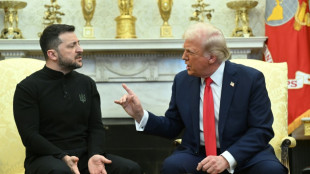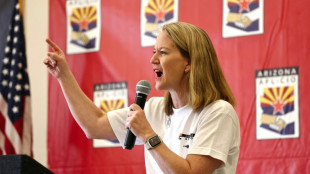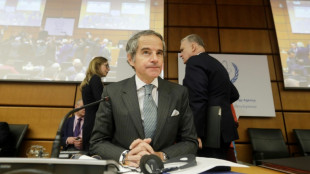

Trump seeks 'fair deal' with China but pathway unclear
US President Donald Trump on Wednesday played up prospects of a "fair deal" on trade with China, but his top officials offered few details of how Washington might de-escalate its damaging tariff war with Beijing.
Trump told reporters his country would have a "fair deal with China," adding that "everything's active" when asked if Washington was talking to Beijing.
Trade tensions between the world's two biggest economies have soared as Trump ramped up levies on imports from China this year, imposing an additional 145 percent on many products over practices Washington has deemed unfair, and other issues.
Beijing in turn has countered with new 125 percent tariffs on US goods.
But despite signals that Washington is looking towards a fair agreement, both countries are "not yet" speaking on tariffs, US Treasury Scott Bessent told reporters Wednesday.
"I think both sides are waiting to speak to the other," he said, at an event on the sidelines of the International Monetary Fund and World Bank's spring meetings in Washington.
He added that there is no unilateral offer from Trump to slash duties on Chinese goods.
- Not 'sustainable' -
Bessent said the staggeringly high tariffs both countries have imposed on each other's goods have to come down before negotiations can occur.
"I don't think either side believes that the current tariff levels are sustainable, so I would not be surprised if they went down in a mutual way," he added on the sidelines of an Institute of International Finance forum.
"This is the equivalent of an embargo, and a break between the two countries in trade does not suit anyone's interest," Bessent said, stressing that "de-escalation by both sides is possible."
But he said he had no timeframe on how soon bilateral talks could take place.
"It's both a blessing and a curse that the strongest relationship is at the very top," Bessent said, referring to Trump's ties with Chinese President Xi Jinping. With "any de-escalation, the talks would not begin at the very top."
While Trump has swiftly rolled out sharp tariffs on different countries and sectors, he has also been quick to introduce certain exemptions -- most recently some temporary reprieve for tech products like smartphones and chipmaking tools.
And he could widen the carveouts, the Financial Times reported Wednesday, saying Trump could exempt car parts from some tariffs on Chinese imports -- alongside those on steel and aluminum.
Separately, Bessent said Wednesday that he did not have a stand on whether the president had the authority to fire Federal Reserve Chair Jerome Powell if he wanted to.
He suggested Trump's previous comment that the "termination" of Powell could not come fast enough might also refer to the end of the Fed chief's term.
Earlier Wednesday, Bessent said in a speech that Beijing's export-reliant economic model is "unsustainable" and "not only harming China but the entire world."
He stressed US concerns around trade imbalances that the Trump administration says it hopes to address through sweeping tariffs.
But Bessent maintained that "America first does not mean America alone."
He insisted that the administration's moves are broadly a call for "deeper collaboration and mutual respect among trade partners," while taking aim at "intentional policy choices" by other countries that he said have hollowed out US manufacturing and put its security "at risk."
Y.al-Turki--BT




